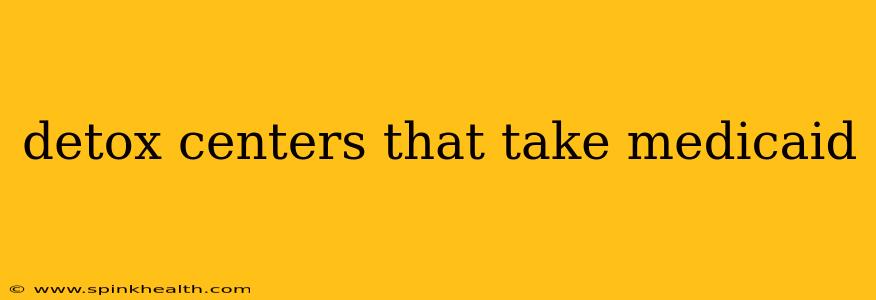Finding Detox Centers that Accept Medicaid: A Guide to Navigating the System
The journey to recovery is a personal one, and finding the right support is crucial. If you or someone you know needs help with substance abuse and relies on Medicaid for healthcare coverage, the search for a detox center that accepts it can feel overwhelming. This guide aims to illuminate the path, sharing real-world experiences and providing actionable steps to find the care you need.
Imagine Sarah, a single mother struggling with opioid addiction. Medicaid is her primary healthcare insurance, and she desperately needs detox services to begin her recovery journey. The sheer number of treatment options, coupled with the uncertainty of insurance coverage, creates a confusing and potentially discouraging landscape. Sarah's story, though fictional, mirrors the struggles many face. This guide is dedicated to helping people like Sarah navigate this complex process.
What is Medicaid, and how does it cover detox services?
Medicaid is a joint federal and state program providing healthcare coverage to millions of low-income Americans. The specifics of Medicaid coverage for substance abuse treatment vary significantly from state to state. While Medicaid generally covers substance abuse treatment, including detox, the extent of this coverage—the types of facilities covered, the length of stay, and specific services—differs depending on your location and the state's Medicaid program rules.
How can I find detox centers that accept Medicaid in my area?
This is often the most daunting step. There isn't a single national database listing all Medicaid-accepting detox centers. Here's a multi-pronged approach:
-
Contact your state's Medicaid agency: This is the most reliable source. Your state's Medicaid agency will have the most up-to-date information on providers in your area that accept Medicaid for substance abuse treatment. Their website usually provides a provider search tool or contact information.
-
Utilize the SAMHSA National Helpline: The Substance Abuse and Mental Health Services Administration (SAMHSA) operates a national helpline (1-800-662-HELP (4357)) that can provide referrals to treatment centers in your area. Be sure to explicitly state that you need a facility that accepts Medicaid.
-
Search online directories: Several online directories list substance abuse treatment centers. While not all will explicitly state Medicaid acceptance, you can call the facilities directly to inquire.
-
Reach out to local hospitals and community health centers: These often have connections to local substance abuse treatment providers and can offer guidance.
-
Ask for referrals from your doctor or therapist: If you are already under the care of a medical professional, they may be able to provide referrals to appropriate facilities.
What questions should I ask potential detox centers?
Once you've identified potential centers, ask these crucial questions:
- Do you accept my state's Medicaid plan? Be specific about your plan name.
- What type of detox services do you offer? (e.g., medically managed detox, medication-assisted treatment)
- What is the length of stay for detox?
- What are your admission requirements?
- What aftercare services do you offer? Detox is just the first step; successful recovery often requires ongoing support.
- What is your payment policy? What are the out-of-pocket costs? Even with Medicaid, there might be co-pays or other fees.
What if I can't find a detox center that accepts Medicaid?
Don't lose hope. Several options are available:
- Explore state-funded programs: Many states have additional programs to assist individuals seeking treatment who lack adequate insurance coverage.
- Negotiate payment plans: Some facilities might be willing to work with you to create a payment plan.
- Seek assistance from non-profit organizations: Many organizations dedicated to addiction recovery offer financial assistance.
Finding a detox center that accepts Medicaid requires proactive effort and persistence. By using the strategies outlined above, and by being persistent and advocating for yourself, you can find the support you need to begin your journey toward recovery. Remember, you're not alone, and help is available.

